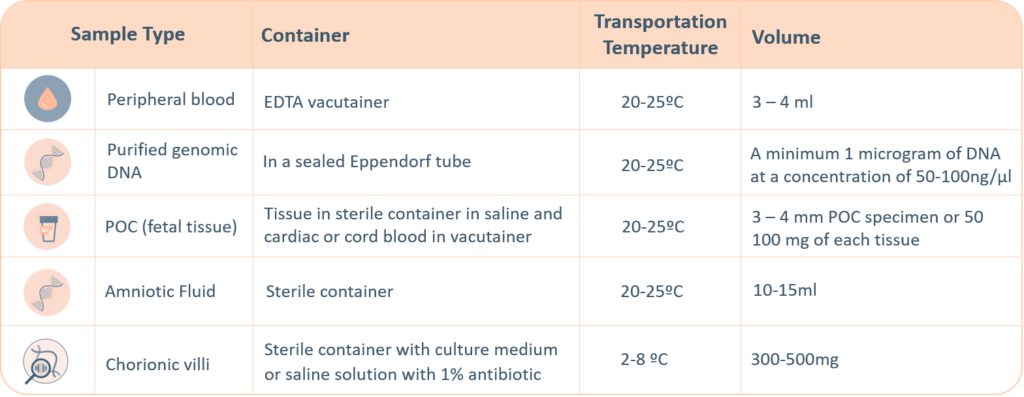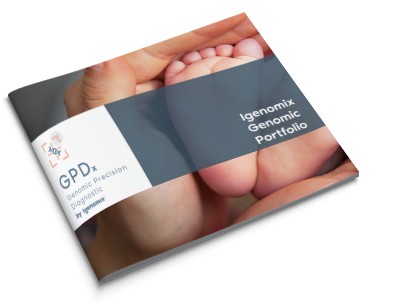- Single gene testing with Igenomix includes the possibility to individually analyse single genes that are that are associated with a clinical phenotype using next generation sequencing.
- Our test menu represents all the clinically relevant genes that have been selected based on curated gene reviews, OMIM, variant databases (HGMD and ClinVar), most recent literature, and customer requests.Testing for single gene disorders can be done using several different technologies depending on the gene and disease in question.
NGS – Next Generation Sequencing

Single gene testing can be performed at all life stages and is indicated in patients with:
- Distinctive clinical features
- Family history of a specific disorder
- Family testing confirmation
Single gene sequencing by NGS can be applied:
- If the clinical indications are distinctive enough to diagnose a single gene disorder
- To sequence full coding regions of a gene in a single reaction
- For carrier testing of known familial genetic conditions
- To confirm biochemical / premarital tests with an indication of a single gene disorder
There are three possible results that can be obtained from single gene sequencing by NGS
-
Positive (Pathogenic and likely pathogenic)
A positive result indicates that one or more variations have been identified in association with the disease phenotype under study. This scenario will allow to provide genetic counselling or personal guidance regarding possible medical treatments, disease progression, reproductive-/prevention-strategies and potential implications for other family members
-
Negative:
A negative result indicates that no disease-causing genetic variant was identified in the test performed. It does not guarantee that the induvial will be healthy or free from other genetic disorders or medical conditions. Additionally, a negative result does not rule out a genetic cause of the disease nor does it eliminate the risk for future offspring. However, if a negative test result is obtained and the variant in question is known to be present in affected family members, this then rules out a diagnosis of that genetic disorder in the proband. A negative result may be explained by several causes, including limited genetic knowledge and limitations associated to the used methodology
-
Inconclusive / Variant of Uncertain Significance (VUS):
A finding of a variant of uncertain significance indicates that a change in a gene was detected, but it is currently unknown whether that change is associated with a genetic disorder or disease. A variant of uncertain significance is not the same as a positive result and does not clarify whether the proband is at an increased risk to develop a genetic disorder or disease. The change could be a normal genetic variant, or it could be disease-causing. Further analysis may be recommended, including testing both parents as well as other affected and unaffected family members. Sometimes, performing ancillary tests is necessary to prove the phenotype that the proband presents with. Detailed medical records or information from other family members also may be needed to help clarify the result
Sample Requirements
For genetic testing through next generation sequencing, the following sample types are accepted. A thorough labelling of the tube with unique identifying information is suggested, incorrect labelling can lead to rejection of the sample. The minimum required information to identify and accept a sample is – Patient’s full name, Date of birth, Gender and Medical Record Number.

- Maternal blood sample must be sent with all products of conception, CVS and Amnio samples
- Precedence will be given to all prenatal samples
The ‘informed consent’ form and the ‘test requisition from’ (included within the provided kit) must be properly filled-in and signed by the patient and sent with the samples inside the shipping box or by e-mail to the laboratory. Igenomix will send you all the documents needed for the pick-up and transportation of the appropriate kit to our laboratory.
Methodology

Limitations
- The main limitation of single gene testing is the highly specific nature of the test. If the diagnosis of the patient is unknown or the patient has an unclear phenotype, we recommend visiting our precision panels or Whole Exome Sequencing page.
Why Choose IGENOMIX?
High-Quality interpretation
Genetic counselling E-learning platform
Easy & Fast Online tests management
Local Labs over the Middle East
All Technical capabilities In-House
100% In-House sequencing and Bio IT
CAP & ISO accredited lab
Using international, population and
diseases Databases, including HGMD





